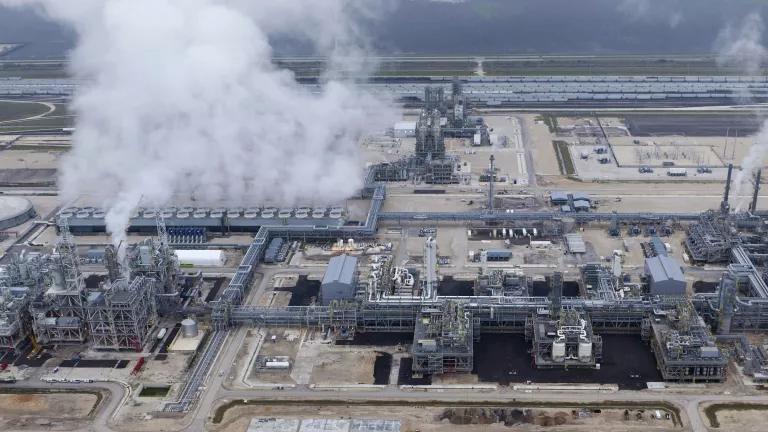I just returned from a Congressional hearing convened by Sen. Barbara Boxer (D-CA) to address the big coal ash spill last month in Tennessee. As tee'd up by Ben Jervey on NRDC's Greenlight blog, this hearing follows a damning New York Times story yesterday exposing how power plant waste lagoons all over the country are not subject to federal hazardous waste standards. Astoundingly, landfills that hold household waste are more regulated than these coal ash waste dumps, which contain toxic chemicals -- like arsenic, lead and mercury -- that pose safety risks to the environment and human health.
NRDC issued a statement prior to the hearing outlining our recommendations to implement strong standards for coal waste.
I arrived early to the hearing and luckily got a seat. The room was packed -- with an overflow crowd outside that had to settle for viewing the action on a TV monitor set up in another room.
Sen. Boxer began the hearing by recognizing some of the victims of the tragedy who were sitting in the front row. In her opening statement she noted that the wall of toxic ash and water which poured out of the containment pond was 100 times more in volume than the oil spilled by the Exxon Valdez disaster. She displayed charts denoting the specific health risks associated with exposure to each of the heavy metals in the toxic sludge. She pointed out the irony that air pollution laws have achieved success in reducing the toxins from smokestacks, causing these heavy metals to be captured by scrubbers and stored as solid waste which now is contaminating water quality. In fact, she explained that reports show 67 coal ash waste ponds in 23 states have either polluted or are suspected of contaminating water supplies through leaks or spills.
Sen. Boxer showed harrowing blown-up photographs of the debris piled up on the front porch of one home and of children walking through the contaminated muck covering neigborhood lawns. She also held up a mason jar filled with coal ash sludge that residents fear may make their water unsafe to drink.
Even though three homes were completely destroyed and several others damaged, fortunately no one was killed or seriously injured from the spill at the TVA Kingston power plant in eastern Tennessee. However, Sen. Boxer said she "shuddered to think" what could have happened had this blowout occured on a warm summer day when people typically would be out fishing and boating on the river. (At this point I overheard a TVA official sitting behind me whisper cynically to his colleague: "But it didn't!")
Closing out her remarks, Sen. Boxer challenged TVA to live up to its mission statement: "[B]eing a national leader in technological innovation, low-cost power and environmental stewardship." She also apologized for not previously looking closely at TVA operations and vowed to lead a new era of government oversight.
Before inviting the panel of witnesses to speak, Chairwoman Boxer allowed her colleagues on the Senate Environment & Public Works Committee to make brief opening statements. Sen. Frank Lautenberg (D-NJ) dinged TVA's initial public response to the spill -- he said TVA officials claiming that coal ash sludge isn't harmful to people was, quite frankly, not helpful. Newly elected Sen. Mark Udall (D-Colorado) Sen. Tom Udall (D-New Mexico), a long-time environmental champion and brand new committee member, cited this massive spill as the perfect counter to industry's claim that coal is 'clean' and cheap. After all, until this tragedy few people really knew about these dirty, dangerous coal ash impoundments. And their lack of safety standards removes a potentially big external cost for the industry. When those factors are considered, then other -- cleaner -- power sources make more sense.
Of course, Sen. Jim Inhofe (R-OK) used his time to deliver his favorite mantra: blame environmentalists. He blasted "extremist groups exploiting this tragedy to advance their political agenda -- namely, the eradication of coal as a power source."
The rest of the hearing was devoted to witness testimony, beginning with Tom Kilgore, CEO of the Tennessee Valley Authority. In his opening statement, he briefly described for the committee the details of the spill and the TVA's response in the wake of the disaster. Interestingly, he didn't bother to acknowledge the local residents in the room whose homes and property were damaged. After his remarks and the question and answer session -- in which he bobbed and weaved in the finest bureaucratic fashion -- Kilgore abruptly left the hearing instead of sticking around to hear from the other witnesses from environmental organizations. In fact, Kilgore scuttled out quickly with a retinue of about a dozen TVA staffer in tow to hold a press gaggle in the hallway. This shrewdly took reporters out of the room during testimony from the other panelists who were there to criticize TVA, to call for a quick cleanup and to urge the legislators to enact long overdue regulations on coal ash waste disposal and storage.
Sen. Boxer concluded the hearing by imploring her colleagues and the American people to "never forget that all the stuff that's in this muck is so dangerous that we have laws that keep it out of the air." Essentially, the toxic heavy metals -- which occur naturally in raw coal -- do not burn during the combustion process but accumulate in a boiler's ash and are disposed of as solid waste. Sen. Boxer's point is reinforced by a new report detailing the risk to dozens of communities from coal ash impoundments like the one at TVA's Kingston power plant. According to the report, this TVA sludge pond is among nearly 100 "wet dumps" nationwide where utilities between 2000 and 2006 disposed of more than 124 million pounds of coal ash -- waste that contains heavy metals, including arsenic, chromium, lead, nickel, selenium and thallium.
Beyond the lesson that the Kingston spill must be cleaned up and all coal ash dumps need to be regulated to ensure our safety, one thing is certain: the tragedy in Tennessee washes away the effect of millions of industry advertising dollars devoted to selling coal as clean. From the cradle to the grave, coal is a dirty business.



